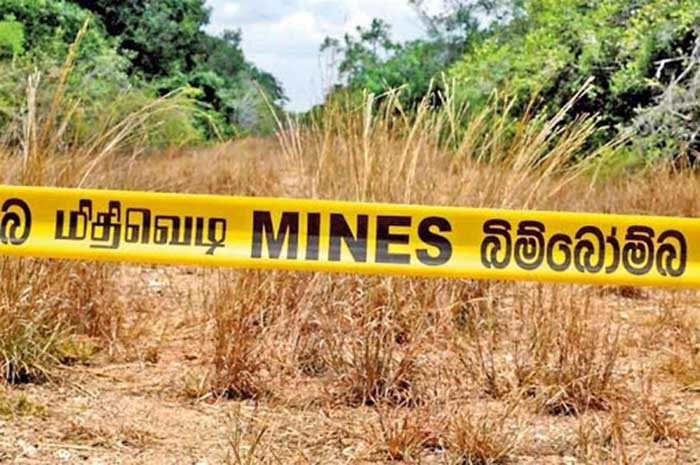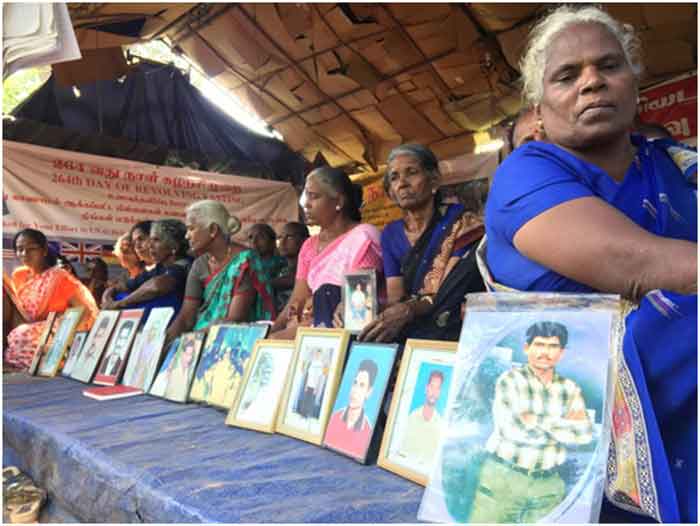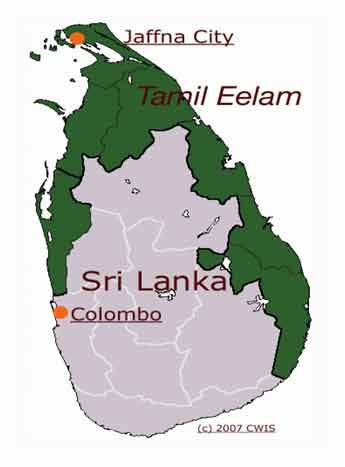
Sri Lanka’s defiance and delaying tactics in implementing its own undertakings and several UNHRC Resolutions by demanding extensions and lame excuses to implement these in good faith and in time.
The UN High Commissioner for Human Rights Michele Bachelet mentioned some of the incidents under the section on “Impunity in emblematic cases” in her annual report to the UN Human Rights Council in March 2021. The relevant excerpt is as follows:
“In previous reports to the Human Rights Council, OHCHR has tracked the investigation and prosecution of emblematic cases as a key measure of Sri Lanka’s commitment to ending impunity.
These include
The killing of five Tamil students in Trincomalee ;
Killing of 17 humanitarian workers in Muttur in 2006;
The assassination of journalist Lasantha Wickrematunge in 2009;
The disappearance of journalist Prageeth Eknaligoda in 2010
The killing of protestors by army personnel during a demonstration at Weliweriya in August 2013;
The anti-Muslim riots in Aluthgama in 2014 and Digana, in 2018, as well as others.
Despite investigations over the years by domestic Commissions of Inquiry and the police, and the arrest of some suspects and trials at bar, not a single emblematic case has been brought to a successful conclusion or conviction.”
UNHRC RESOLUTION 19/2 OF MARCH 22, 2012
On March 22, 2012 – the United Nations Human Rights Council (UNHRC) meeting in Geneva passed a US-sponsored resolution on human rights violations in Sri Lanka.
The resolution urges the Colombo government to implement the recommendations of its own Lessons Learnt and Reconciliation Commission (LLRC), to take steps “to ensure justice, equity, accountability and reconciliation.” It calls for an “action plan” and for the UN Human Rights Commissioner to work “in consultation with, and with the concurrence” of the Sri Lankan government in implementing the LLRC proposals.
In other words, the UN resolution calls for an “action plan” from the very government that is responsible for the military’s killing of tens of thousands of civilians in the communal war with the separatist Liberation Tigers of Tamil Eelam (LTTE), as well as other gross abuses of democratic rights. President Mahinda Rajapakse set up the LLRC to fend off international criticism and whitewash the government and the military.
UNHRC RESOLUTION 22/1 of March 21, 2013
Commission of Inquiry on Lesson Learnt and Reconciliation on November 2011
The following recommendations were put forward for implementation.
In this regards the commission has made 3 recommendations:
- To investigate the specific instances referred to in observations. And any reported cases of deliberate attacks on civilians. If investigations disclose the commission of any offenses, appropriate legal action should be taken to prosecute/punish the offenders.
2) Conduct a professionally designed household survey covering all affected families in all parts of the island to ascertain first-hand the scale and the circumstances of death and injury to civilians, as well as damage to property during the period of the conflict.
- The Government of Sri Lanka should institute an independent investigation into the execution videos of the film Sri Lanka killing fields with a view to establishing the truth or otherwise of these allegations and take action in accordance with the laws of the land.
UNHRC RESOLUTION 25/1 of March 2014
The UNHRC recognized the importance of preserving and analysing evidence relating to violations and abuses of human rights and related crimes in Sri Lanka with a view to advancing accountability. In the circumstances the UNHRC has decided to strengthen the capacity of the UN High Commissioner for Human Rights to collect, consolidate, analyse and preserve information and evidence and to develop possible strategies for future accountability processes for gross violations of human rights or serious violations of international humanitarian law in Sri Lanka. The UNHRC also authorized the High Commissioner to advocate for victims and survivors, and to support relevant judicial and other proceedings, including in Member States, with competent jurisdiction;
UNHRC RESOLUTION 30/1 of October 01, 2015
The United Nations Human Rights Council (UNHRC) adopted the resolution entitled ‘Promoting reconciliation, accountability and human rights in Sri Lanka’ on 1 October 2015, Resolution 30/1. (After a resolution promoted by the European Union (EU) was defeated in 2009 and a resolution tabled by Sri Lanka was adopted by an overwhelming majority. An attempt to table a resolution critical of Sri Lanka in 2010 was aborted). Resolution 30/1 has been described by some critics as a constitution amendment project for Sri Lanka. Interestingly, it was co-sponsored by Sri Lanka. In 2017, Sri Lanka obtained a two year grace period to implement the resolution, further confirming the country’s acquiescence with Resolution 30/1.
UNHRC RESOLUTION 34/1 OF MARCH 23, 2017
Guided by the Universal Declaration of Human Rights, the International Covenants on Human Rights and other relevant instruments, Reaffirming Human Rights Council resolution 30/1 of 1 October 2015 on promoting reconciliation, accountability and human rights in Sri Lanka, Recalling Human Rights Council resolutions 19/2 of 22 March 2012, 22/1 of 21 March 2013 and 25/1 of 27 March 2014, Reaffirming that it is the responsibility of each State to ensure the full enjoyment of all human rights and fundamental freedoms of its entire population, Reaffirming also its commitment to the sovereignty, independence, unity and territorial integrity of Sri Lanka, Welcoming the visits made to Sri Lanka by the United Nations High Commissioner for Human Rights, from 6 to 9 February 2016, and by the Secretary-General, from 31 August to 2 September 2016, Welcoming also the visit made by the Working Group on Enforced or Involuntary Disappearances from 9 to 18 November 2015, the advisory visits made by the Special Rapporteur on the promotion of truth, justice, reparation and guarantees of non-recurrence, the joint visit by the Special Rapporteur on the independence of judges and lawyers and the Special Rapporteur on torture and other cruel, inhuman or degrading treatment or punishment from 29 April to 7 May 2016, and the visit by the Special Rapporteur on minority issues from 10 to 20 October 2016, Welcoming further the steps taken by the Government of Sri Lanka to implement Human Rights Council resolution 30/1, and recognizing in this context the need for further significant progress.
UNHRC RESOLUTION 40/1 OF MARCH 21, 2019
Resolution adopted by the Human Rights Council on 21 March 2019
40/1. Promoting reconciliation, accountability and human rights in Sri Lanka
The Human Rights Council,
Reaffirming the purposes and principles of the Charter of the United Nations,
Guided by the Universal Declaration of Human Rights, the International Covenants
on Human Rights and other relevant instruments,
Reaffirming Human Rights Council resolutions 30/1 of 1 October 2015 and 34/1 of
23 March 2017 on promoting reconciliation, accountability and human rights in Sri Lanka,
Recalling Human Rights Council resolutions 19/2 of 22 March 2012, 22/1 of 21 March 2013 and 25/1 of 27 March 2014,
Reaffirming that it is the responsibility of each State to ensure the full enjoyment of all human rights and fundamental freedoms of its entire population,
Also reaffirming its commitment to the sovereignty, independence, unity and territorial integrity of Sri Lanka,
Recognizing the strong role played by democratic institutions in Sri Lanka in the
peaceful resolution of the political situation that arose in Sri Lanka from October to December 2018,
UNHRC RESOLUTION 46/1 OF MARCH 23, 2021
Recommendation 7 : This Recommendation is the most down to earth one which confirms the following which prevails in Sri Lanka:-
- Signs of a deteriorating situation of human rights over the past years.
- Acceleration of militarization of civilian and government functions.
- Erosion of independent judiciary and key institutions involved in problems of human rights.
- Ongoing impunity and political obstruction of accountability for crimes for both present and past involving state machinery.
- Increased marginalization of Tamil and Muslim communities. This acknowledges the pre-existing marginalization of Tamils and Muslims for a very long period.
- Arbitrary detention, torture, cruel and inhuman treatment, or punishment.
- Risk of recurrence of policies and practices for the rise of past grave violations.
All of the above alleged by UNHRC in short have reinforced the total failure of Sri Lanka in the fields of human rights and accountability.
The Recommendation calling for the review of the Prevention of Terrorism Act [PTA[ as usual is treated with contempt by the Government while this PTA is implemented with full force and vigor. For example, a PTA regulation has been recently used to detain persons under rehabilitation for two years or more without any chance for release.
In conclusion, it has to be stated that the most glaring and inimical omissions in the UNHRC Resolution are:-
[a] Referral of Sri Lanka to the International Criminal Court [ICC] nor the express mention of Independent International Impartial Mechanism [IIIM] as advocated by UNHRC groups. UNHRC High Commissioner and human rights activists.
[b] The omission to mention genocide or even genocidal crimes carried out by Sri Lankan security forces..
The genocidal agenda including structural genocide against the Tamils which was initiated in 1948 is an open book as the commissions of those crimes have been reported and revealed by UN Rapporteurs, UN Human Rights High Commissioners and other human rights groups and human rights activists.
Besides, the breaches of Agreements, Pacts and Understandings stand above top of the other failings of Sri Lankan Governments. The following are the prominent ones among others:-
* Bandaranaike-Chelvanayakam Pact of 1957
* Dudly-Chelvanayakam Agreement of 1965
* Chandrika Bandaranayake’s Peace Proposal of 1995
* Ranil Wickremesinghe/LTTE ceasefire Agreement of 2002
* Ranil Wickremesinghe/LTTE Oslo Accord of 2004
* Mahinda Rajapaksa’s promise of 13+ in 2007
* Promise of an Upper House in 2009
USA’s recent imposing of travel ban on two officials Chandra Hettiarachchi who is alleged in the disappearances of eleven Tamil civilians and Sunil Ratnayake convicted in the killing of eight civilians in the North has given hopes for the victims of human rights, particularly for the Tamil victims confirmed USA’s long arm of accountability stretching to lay its hands on human rights violators living in any country with freedom and enjoying impunity without any punishment. Hope the UK, and EU will adopt similar sanctions for the human rights violators in Sri Lanka whatever position they hold.
Viewing Sri Lanka’s hollow and shallow promises and its cavalier treatment of accountability and justice UN and/or the Security Council owe and undeniable and unavoidable duties and obligations to ensure justice to the victimized Tamils as well as initiating and sponsoring a permanent political settlement guaranteeing its compliance by a dilly-dallying and defaulting Sri Lanka.
Kumarathasan Rasingam, Secretary, Tamil Canadian Elders for Human Rights Org
















































